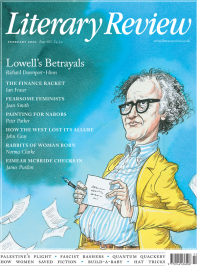Lucy Lethbridge
Out of Lanarkshire
Motherwell: A Girlhood
By Deborah Orr
Weidenfeld & Nicolson 294pp £16.99
The late journalist Deborah Orr’s moving memoir of her Lanarkshire childhood is about many things but, unwittingly perhaps, it does demonstrate how extremely difficult it is to describe one’s parents. Our perspective is skewed by the very intimacy that should make their personalities reveal themselves clearly to us; unshiftable patterns get in the way as well as habits, secrets and alarming contradictions. In Motherwell, Orr wrestles with this problem but, parents being so slippery, she never quite pins them down: John and Win Orr remain elusive, captured in vivid but frustratingly partial glimpses. Nonetheless, there is so much to enjoy in this book: about growing up in the shadow of the Ravenscraig steelworks in a housing scheme called the Timbers in the 1960s and 1970s, about class, culture, women, ambition, social mobility and the jagged, resentful edge between one generation and the next. Orr writes of Motherwell: ‘I couldn’t stand the place, even when it was still in its pomp. But I loved it too. Still do.’ That rugged, furious, chafing love shines through the book.
In the last months of Orr’s life, the acrimonious end of her marriage to Will Self was made horribly public. Although Self is barely mentioned, their relationship does hang over this book like an ugly knot. It’s hard not to conclude that Orr’s obsession with trying to pathologise her parents’ relationship is really about trying to understand her own marriage. Of her father she writes: ‘The last thing he would have wanted was a daughter who was unthinkingly adept at making excuses for controlling, psychosexually fucked-up, abusive male behaviour. Through his own unthinking, automatic efforts, however, that’s what he got.’ She isn’t the first person to find the explanation for fucked-up behaviour in a diagnosis of narcissism: Google the term and thousands of sites come up devoted to spotting the warning signs of it, such as ‘triangulation’, ‘gaslighting’ and ‘grandiosity’. Orr sees narcissism, for example, in her own tendency to exaggerate her working-class roots to heighten her achievements, and in her parents, whose ‘heightened self-love’ was ‘in constant battle with exaggerated self-loathing’. Her mother triangulated her affections, dangling her approval, and her prejudiced father ‘othered’ anyone who was different.
John was Scottish while Win was from Brentwood, Essex. He was a factory worker; although Win worked as a wages clerk, it was her most firmly held belief that it was every woman’s destiny to be a housewife. Her own skills and accomplishments were legion. She was a creative powerhouse

Sign Up to our newsletter
Receive free articles, highlights from the archive, news, details of prizes, and much more.@Lit_Review
Follow Literary Review on Twitter
Twitter Feed
Margaret Atwood has become a cultural weathervane, blamed for predicting dystopia and celebrated for resisting it. Yet her ‘memoir of sorts’ reveals a more complicated, playful figure.
@sophieolive introduces us to a young Peggy.
Sophie Oliver - Ms Fixit’s Characteristics
Sophie Oliver: Ms Fixit’s Characteristics - Book of Lives: A Memoir of Sorts by Margaret Atwood
literaryreview.co.uk
For a writer so ubiquitous, George Orwell remains curiously elusive. His voice is lost, his image scarce; all that survives is the prose, and the interpretations built upon it.
@Dorianlynskey wonders what is to be done.
Dorian Lynskey - Doublethink & Doubt
Dorian Lynskey: Doublethink & Doubt - Orwell: 2+2=5 by Raoul Peck (dir); George Orwell: Life and Legacy by Robert Colls
literaryreview.co.uk
The court of Henry VIII is easy to envision thanks to Hans Holbein the Younger’s portraits: the bearded king, Anne of Cleves in red and gold, Thomas Cromwell demure in black.
Peter Marshall paints a picture of the artist himself.
Peter Marshall - Varnish & Virtue
Peter Marshall: Varnish & Virtue - Holbein: Renaissance Master by Elizabeth Goldring
literaryreview.co.uk